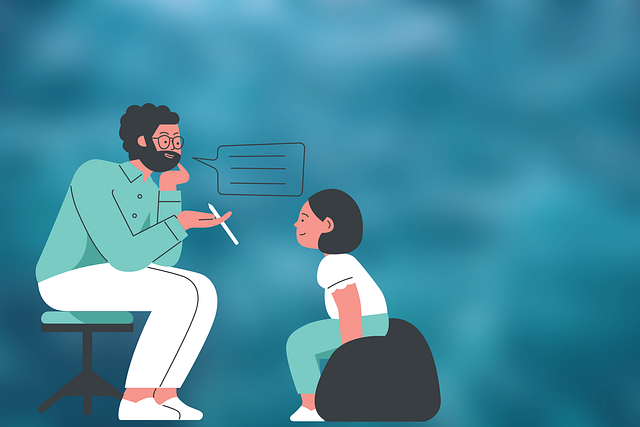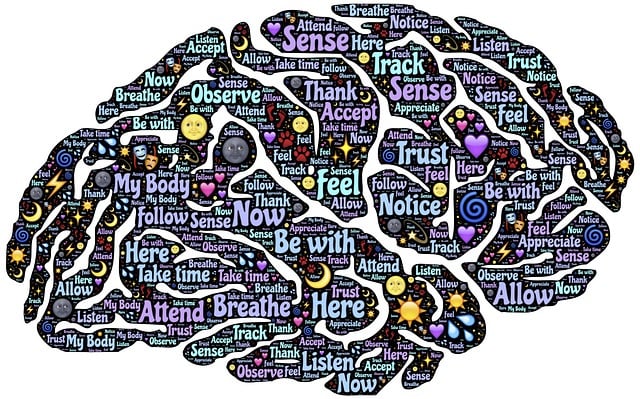Mindfulness meditation is an effective therapy for young children, offering a gentle yet powerful approach to manage stress, anxiety, and trauma. Through engaging activities like guided visualizations and breathing exercises, children learn emotional regulation and communication skills. Regular practice enhances mental wellness, builds resilience, and promotes healthy habits from an early age. Using appropriate mindfulness techniques, professionals can help children regulate emotions, focus, and foster self-awareness, particularly in processing traumatic memories. Creating a supportive environment with quiet spaces, soft lighting, and soothing sounds normalizes mindfulness practices, fostering regular emotional well-being for children dealing with trauma or seeking alternative techniques. Overcoming challenges with consistent guidance allows children to develop coping mechanisms, improve stress management, and enhance overall resilience and well-being.
“Unwind and discover the power of mindfulness meditation, a transformative practice for young minds. This comprehensive guide offers parents and caregivers a roadmap to supporting children in navigating stress and trauma through mindfulness. From understanding its benefits to choosing suitable techniques, we explore practical strategies. Learn how to create a safe space for practice, overcome common challenges, and track progress. Empower your child with the tools to cultivate mental resilience and find inner peace.”
- Understanding Mindfulness Meditation for Children
- Identifying Suitable Mindfulness Techniques
- Creating a Supportive Environment for Practice
- Overcoming Challenges and Tracking Progress
Understanding Mindfulness Meditation for Children

Mindfulness meditation has gained significant attention as a powerful tool for fostering mental wellness in children. This ancient practice involves training the mind to be fully present and aware of the current moment, sans judgment. For young minds that often grapple with stress, anxiety, or even trauma, mindfulness offers a gentle and effective therapy. By integrating this into their daily routines, children can learn essential communication strategies to express their feelings and develop better emotional regulation skills.
The benefits extend beyond immediate relaxation; regular mindfulness practice enhances overall mental wellness, helping kids navigate challenges with resilience. It encourages them to observe thoughts and emotions without reacting impulsively, which is crucial for managing traumatic experiences. Moreover, mindfulness meditation can be tailored to suit various ages, making it accessible through engaging activities like guided visualizations or simple breathing exercises, even for younger children who may not yet read or sit still for long periods. This approach ensures that kids develop healthy habits from an early age, setting them up for success in navigating life’s stressors and challenges ahead.
Identifying Suitable Mindfulness Techniques

Identifying suitable mindfulness techniques is a crucial step in incorporating this practice into your life, especially when considering its therapeutic benefits for young children who have experienced trauma. Mindfulness meditation offers a gentle and effective way to help children regulate their emotions, improve focus, and develop a deeper sense of self-awareness. Techniques such as body scans, mindful breathing exercises, and guided visualizations can be particularly beneficial for young minds. These practices encourage children to connect with their senses, fostering a calming effect that can aid in processing traumatic memories and promoting mental well-being.
When adapting mindfulness for therapy sessions with young clients, mental health professionals must conduct a thorough risk assessment to ensure the safety and suitability of these techniques. Building confidence through mindfulness can be a game-changer, helping children develop resilience and coping strategies. Moreover, community outreach program implementations that integrate mindfulness workshops or educational sessions can extend these therapeutic benefits to a wider audience.
Creating a Supportive Environment for Practice

Creating a supportive environment is key to establishing a successful mindfulness meditation practice, especially for young children who may be navigating trauma or seeking emotional well-being promotion techniques. Start by choosing a quiet space free from distractions. A calm and serene atmosphere helps children focus on their breath and internal sensations, fostering mental wellness journaling exercise guidance. Consider using soft lighting, comfortable seating, and perhaps some soothing music or nature sounds to create a sense of tranquility. This environment should be a safe haven where they can feel secure and at ease, encouraging regular practice.
In light of the above, public awareness campaigns development around mindfulness and meditation can further benefit children by normalizing these practices. By sharing success stories and highlighting the positive impact on mental health, more kids will be open to exploring these techniques, potentially revolutionizing their emotional well-being journey.
Overcoming Challenges and Tracking Progress

Overcoming challenges is a significant aspect of mindfulness meditation practice, especially for young children who may be dealing with trauma. It’s crucial to remember that every child’s journey is unique. Some may face difficulties in focusing or maintaining calmness due to past experiences. Through consistent and patient guidance, these hurdles can be turned into opportunities for growth. Mindfulness meditation offers tools to help children navigate their emotions, fostering a sense of control and inner strength. Regular practice allows them to develop coping mechanisms, improving their ability to manage stress and anxiety.
Tracking progress is essential to keep young minds motivated. Encourage children to reflect on their experiences, noting any improvements in their emotional awareness or reactions. This can be done through simple journaling activities or conversations with a trusted adult. By providing trauma support services and incorporating social skills training, children can build resilience while enhancing their overall well-being. Inner strength development is a powerful outcome of mindfulness, empowering young individuals to face challenges head-on.
Mindfulness meditation offers a gentle yet powerful tool for helping young children navigate stress, anxiety, and even trauma. By incorporating simple techniques into their daily routines, parents and caregivers can create a sense of calm and foster emotional well-being. Through a supportive practice environment and consistent tracking of progress, children can develop essential self-regulation skills that will benefit them throughout their lives. Remember, every small step towards mindfulness is a significant step towards a happier, healthier future for our little ones.










